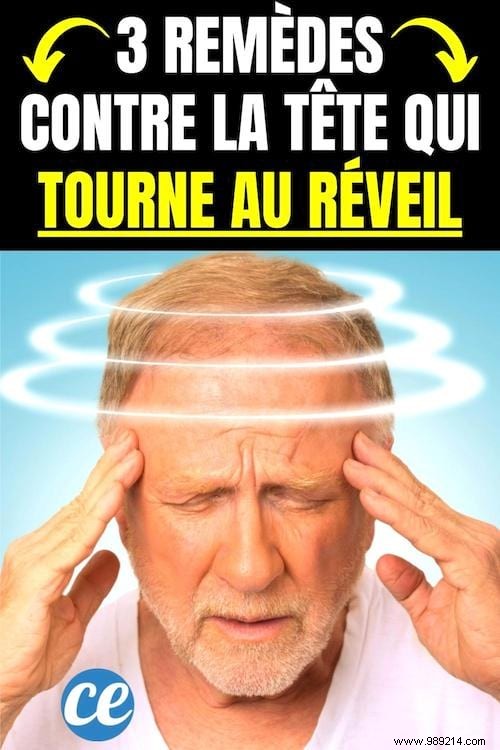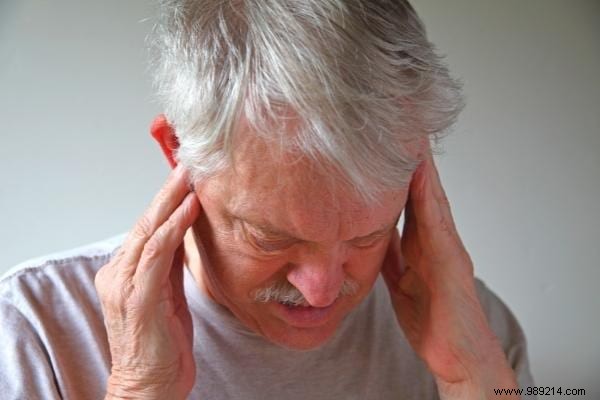
Have you ever felt dizzy when you wake up when do you get out of bed?
You have a feeling of loss of balance while you walk without understanding why.
Well it can be a simple temporary tiredness, but also and above all dizziness!
Orthostatic hypotension, benign paroxysmal, vestibular neuritis...
These are the kinds of problems you can face if you suffer from vertigo.
But do not worry; my doctor explained everything to me on the subject.
I who suffered from this disorder for a long time at bedtime and upon waking up, I was able to solve the problem naturally.
Check outthe 3 natural remedies I used for dizziness upon waking up. Watch:


A sudden drop in blood pressure can lead to what is called orthostatic hypotension.
Quesaco?
Well, behind these learned words, hides quite simply the fact of getting up too quickly.
Have you ever had blurred vision when you get up from the sofa too quickly?
Well, that's the phenomenon it's all about.
That said, this type of dizziness most often happens in the morning when you wake up, when you get out of bed.
We go too quickly from lying down to standing up.
Normally, the body compensates for the problem.
But if it doesn't, you have ostathic hypotension.
The spinning effect doesn't last very long, but it's super unpleasant.
This type of disease affects only 7% of the general population.
But among those over 65, this rate rises to 65%!
If you suffer from orthostatic hypotension, here are the first things to do.
Get up as slowly as possible, first sitting on the edge of the bed for a few minutes.
That way, it gives the body time to properly circulate the blood and bring back good blood pressure.
If these disorders are frequent, avoid skipping meals. You could suffer from hypoglycemia.
If you have hypertension, do not consume too much sugar, salt and bad fats.
This aggravates the symptoms of dizziness.
Be careful, if the problem persists, it may be due to a more serious neurological disorder.
In this case, go see a doctor so that he can carry out the necessary additional examinations.

Another type of vertigo, called positional, can also ruin your life:
This is called "benign paroxysmal".
The effects of this vertigo are felt when there is a sudden change in the positioning of the head.
It can therefore happen when you are lying in bed, but also standing up during the day.
Several causes explain the presence of this disorder.
It can be the consequence of a shock to the head or following a fall.
But also and above all, it may be due to the presence of otoliths (microcrystals) in the inner ear.
These otoliths can become dislodged when you move your head suddenly.
They then land in the semicircular canals preventing them from functioning normally.
This is what creates vertigo.
The benign paroxysmal is, as its name suggests, not serious in itself.
Its effects do not last long, but are nevertheless very annoying (feeling sick, nausea...).
The solutions to treat this evil?
Well, that depends on the origin of the problem.
If it comes from a shock, it is often the cervical (the 1st in particular) which are in question.
In this case, it is necessary to consult an osteopath or a vestibular physiotherapist.
Since this dizziness comes from a cervical problem, these medicines perfectly correct the problem.
In 8 out of 10 cases, one or two sessions are usually enough to get rid of the pain.
If the problem comes from the otoliths in the inner ear, go see an ENT to confirm the diagnosis.
He knows the problem well and usually advises to seek help from a physiotherapist.
The latter uses "repositioning" techniques that work in 90% of cases.

Homeopathy is an alternative medicine useful for treating all forms of vertigo.
To reduce the troubles, take 5 granules of Phosphorus or Bryonia alba in 9 ch every hour.
If you also have nausea and vomiting, take Cocculus indicus.
In case of violent dizziness in the morning on waking, turn instead to Cocculus alumina.
Finally, if in addition to dizziness you can't stand noise, prefer to take Theridion curassavicum.

Do you have trouble standing while having very strong nausea and feeling unwell?
You are probably suffering from vertigo called "vestibular neuritis".
This intense vertigo usually appears in the morning upon waking and lasts more than 20 min.
The most serious forms even persist for more than 12 hours and can last for several days!
Vestibular neuritis has a viral and infectious origin in the ear.
Not uncommon to see this vertigo accompanied by other problems such as tinnitus, deafness...
In this case, Ménière's disease is the cause.
To treat these 2 types of vertigo, unfortunately there are no drugs or actions to take.
Neuritis usually leaves after a week, or even 2 at most.
You can take drugs that help the brain compensate for the disorder, but nothing more.
For Ménière's disease, I'm sorry to tell you that there are no miracle cures.
Anti-dizziness drugs can limit the inconvenience by spacing out the attacks, but that's all.

When you have a dizzy head, you often confuse dizziness with vertigo.
But it's not the same thing at all!
They do not have the same symptoms or the same health effects.
It is therefore important to know how to identify one or other of these ailments in order to better treat yourself.
Dizziness is a kind of mild spinning sensation.
Even if they are benign, they can be quite frequent and come from several factors:
- Temporarily low blood pressure (orthostatic hypotension).
- Winter viruses (flu, cold, gastro, allergy...).
- Stress, anxiety, excessive consumption of alcohol, tobacco, drugs, medication.
- Temporary fatigue, hypoglycaemia.
- Pregnancy.
Dizziness has much more pronounced effects.
A great vertigo gives the sensation of the body moving in space.
The loss of balance effect is greater.
You feel like you're drunk without drinking alcohol!
Dizziness occurs when the brain receives some sort of wrong signals from the body.
It's the function called the vestibular system in the inner ear that's malfunctioning.
This may have been:
- A disorder of the inner ear:infection, Ménière's disease, benign paroxysmal vertigo.
- To neuritis or acoustic neuroma.
- Ischemia (CVA), inflammatory lesion (multiple sclerosis), tumor...
- Neurological or cerebral damage.
You see, vertigo comes, unlike dizziness, from quite serious pathologies.
Have you tested our methods to make your dizzy head disappear in the morning? Let us know in the comments if it worked for you. We can't wait to read you!